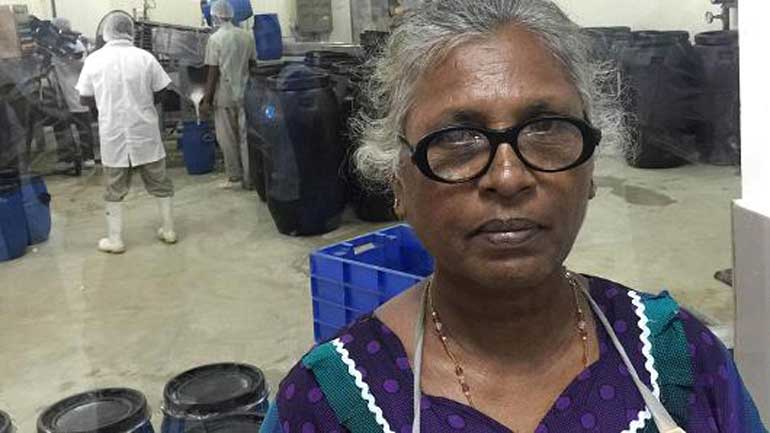Friday Feb 27, 2026
Friday Feb 27, 2026
Saturday, 30 April 2016 00:00 - - {{hitsCtrl.values.hits}}

Rasanayagam Sarojinidevi, 64, lost both her sons during the war and is still traumatised, but says she has found a new purpose working at a food processing factory owned by Cargills Ceylon.
www.cnbc.com: It looks peaceful and serene in the late afternoon but Elephant Pass – a strategically important gateway controlling access to and from Jaffna, the capital of Sri Lanka’s northern province - was the focus of bitter fighting between the separatist Tamil Tigers and the security forces.
This is where war memorials honor the soldiers that fell in the government’s campaign against the Tigers. But nothing tells the story of the civilian lives lost. And those that remain say they’re struggling to re-build homes, businesses and a broader self-sustaining local economy under the shadow of military occupation.
What’s encouraging is that enlightened business leaders in the private sector are stepping up. Sri Lankan conglomerate Cargills Ceylon and hotel group Jetwing have made investments with an emphasis on hiring locally and empowering the local community.
We visited a fruit, vegetable and dairy processing center owned and operated by Cargills Ceylon in what was once a war zone.
“It was a jungle when I came here in 2013, thick, scrub jungle,” general manager Samuel Neshakumar tells me over locally made fresh mango juice. Now it’s a bustling and thriving factory that supports 450 farming families.
Farmer Ponniah Maheswarn says he gets a good price for his produce, and he’s growing cash-crops with more certainty now that he has a guaranteed buyer.
“They give us good rates if we give them good produce. There is no issue in that,” he says.
A devout Hindu, Ponniah has nothing but praise for Cargills. He calls them “second only to God,” a sentiment echoed by 64-year-old Rasanayagam Sarojinidevi, who works in the staff canteen.
“For me to work here is a huge blessing from God. God has shown me this place, given me this job, only He has done this for me. I am finally peaceful here.”
Cargills deputy chairman Ranjit Page says the battle for hearts and minds was a tough one.
“Winning them over, and for them to believe in a corporate from another part of the country is a challenge,” Page recalls.
But problems persist and are limiting this region and its people from realising their full potential. Debt levels have soared. Many cannot pay back what they owe, and that’s led to reported suicides.
Several families we talked to – like Sivanesan Kamalarany and her family, uprooted by the war - are still waiting to be re-housed. They’re frustrated by what they see as a lack of progress and it’s taken a heavy emotional toll.
Kamalarani and her family fled to India in 1998 after their home was destroyed by artillery shelling. They returned in 2012 and built a temporary home by themselves but are still looking for a permanent place to live.
Rajeshkumar Vijayarany tells a similar story.
“We are living with hope now that they will give us a house… living another day as a refugee doesn’t help, and this is our land.”
The military’s presence here is undeniable. Much land remains under military and government control; the army even controls and operates businesses, from lagoon-side resorts to tours of former battlefields. Our crew took lunch in the picturesque Thalsevana Holiday Resort – run openly by the military, as its website proudly states – in a high-security zone.
Many in the country’s capital Colombo argue the military’s continued presence is necessary to prevent the Tigers from regrouping. But locals believe it sows distrust.
The previous administration did increase spending on infrastructure. The Yal Devi, a Colombo to Jaffna train service, was reconnected after 25 years. And war-weary Tamils appear to be putting the past behind them. In 2013, voter turnout in provincial election was almost 70 percent, the highest of any Sri Lankan province. The landmines have for the most part been cleared.
It’s clear what needs to be done next – pick up the pace of post-conflict reconstruction, rehabilitation and reconciliation. The return of the successful Tamil diaspora would be a game-changer in terms of expertise, access to capital and support. Plus, demilitarisation of former conflict areas and the revival of what were once thriving local industries are key.
The cement factory we visited in a high-security zone near the coastal town of Kankesanthurai is a good example. In its post-independence heyday, this cement works was a pioneering northern industrial development.
Now, it’s idle, rusting, its parts cannibalised, at a time when it should be producing the material so badly needed for reconstruction. But talks have started to revive the cement factory, possibly with investment from the United Arab Emirates.
Green shoots are appearing but the road to a lasting recovery is proving to be a painfully slow one.